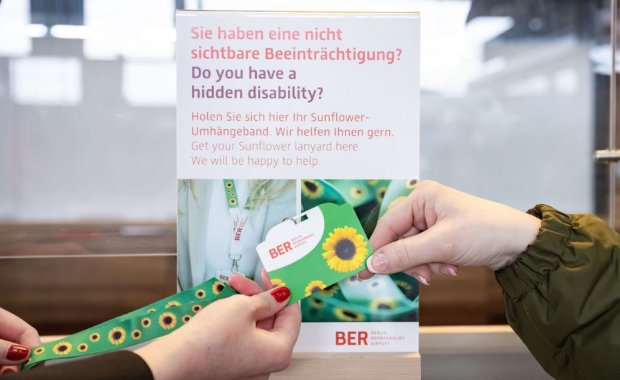Berlin Brandenburg BER, the Sunflower Airport

Program to support people with hidden disabilities launches. Berlin Brandenburg Airport is the first German airport to launch the Sunflower lanyard. The Sunflower lanyard is an internationally recognised symbol for hidden disabilities. People with hidden disabilities should be able to use all travel options at BER without any restriction.
With the help of the lanyard, wearers are given the opportunity to clearly signal that they have a hidden disability. This way, everyone at the airport – the staff as well as fellow passengers – can be prepared for the fact that Sunflower wearers may need assistance, a little more time or a little patience during their stay at BER.
The lanyard is available at BER with immediate effect at all passenger information desks in Terminals 1 and 2 and from the Mobility Service.
Thomas Hoff Anderson, Chief Operations Officer, Flughafen Berlin Brandenburg GmbH: “Our focus is on the needs of our passengers and our goal is to make their travel experience as pleasant and easy as possible. At the same time, we want to reduce barriers and expand opportunities. By introducing the Sunflower lanyard, we are giving many people the possibility to nonverbally and clearly signal their desire for assistance when traveling. This way, we simplify travel from BER and create a new understanding of each other. I am convinced that the Sunflower lanyard will have a lasting positive impact on the travel experience of many of our passengers.”
Paul White, CEO of Hidden Disabilities Sunflower: “We are delighted to welcome Berlin Brandenburg Airport as the first organisation in Germany to become members of the global Hidden Disabilities Sunflower network. Their work to implement and embed the Sunflower has been outstanding, with staff at the airport ready to recognise and support wearers.
Sunflower wearers travel for many reasons, and the knowledge that barriers are being removed to increase accessibility and inclusion will significantly reduce anxiety and stress for those passengers.”
Stine Ringvig Marsal, CEO Hidden Disabilities Sunflower Nordics, supporting the program roll out at BER: “Being the first German company to join the Sunflower, not only means that travelling from BER will become more accessible to people with hidden disabilities. It is much larger than that. Other German companies will join the Sunflower, also train their employees and make a positive change internally towards employees and externally towards customers.”
Hidden disabilities can be as diverse as the people themselves can be. Just because you cannot see something does not mean it is not there. For people with hidden disabilities, it is often a big challenge to get from one place to another or through spaces or places with lots of people, like the airport, for example. The spectrum of hidden disabilities is broad, they can be physical, mental or neurological and include, but are not limited to, autism and ADHD, cognitive impairments such as learning difficulties and dementia, as well as mental health conditions and speech, visual impairments or hearing loss. They also include respiratory and chronic conditions such as asthma, diabetes, chronic pain and sleep disorders that significantly affect daily life. Many people also have a combination of visible and hidden disabilities and illnesses. Therefore, no one solution can effectively help those affected on their journey. It takes people who respond to the needs of passengers at the right moment and the Sunflower lanyard gives BER employees the opportunity to specifically approach the wearer for help.
What is the Sunflower programme?
The Sunflower lanyard was launched in 2016 as a symbol for hidden disabilities. The company “Hidden Disabilities Sunflower” was founded in the UK to meet the rapidly growing demand to support people with non-visible disabilities. It is now widely recognised in many sectors, including travel. Today, the global Hidden Disabilities Sunflower works to raise awareness of hidden disabilities and improve disability inclusion.
